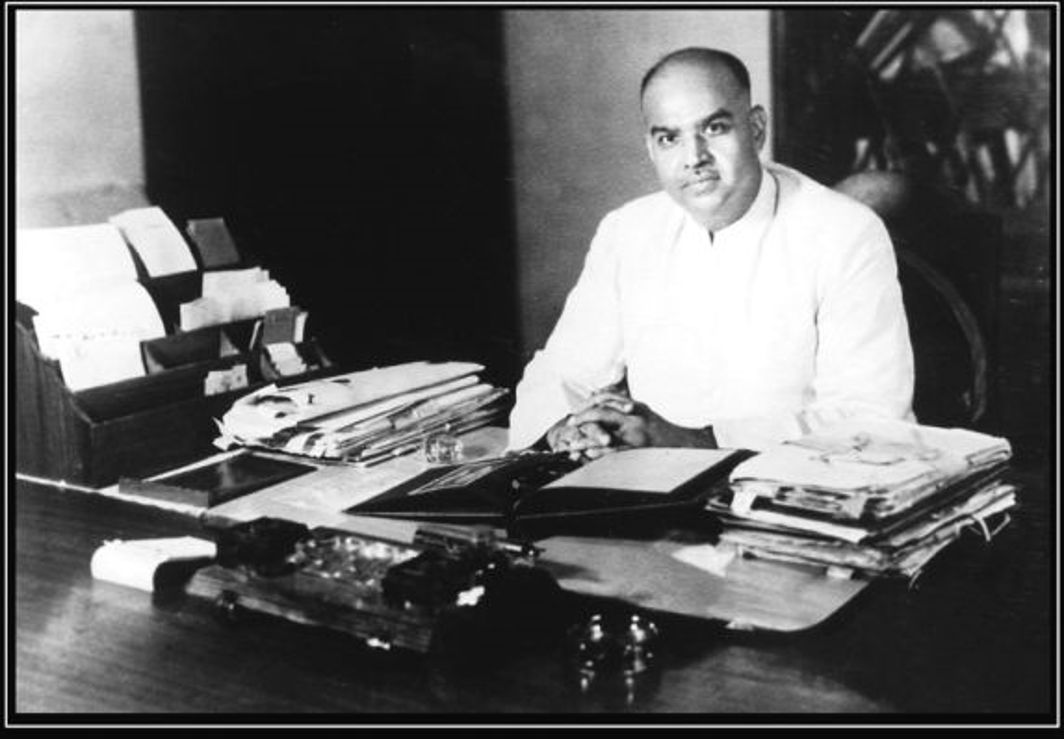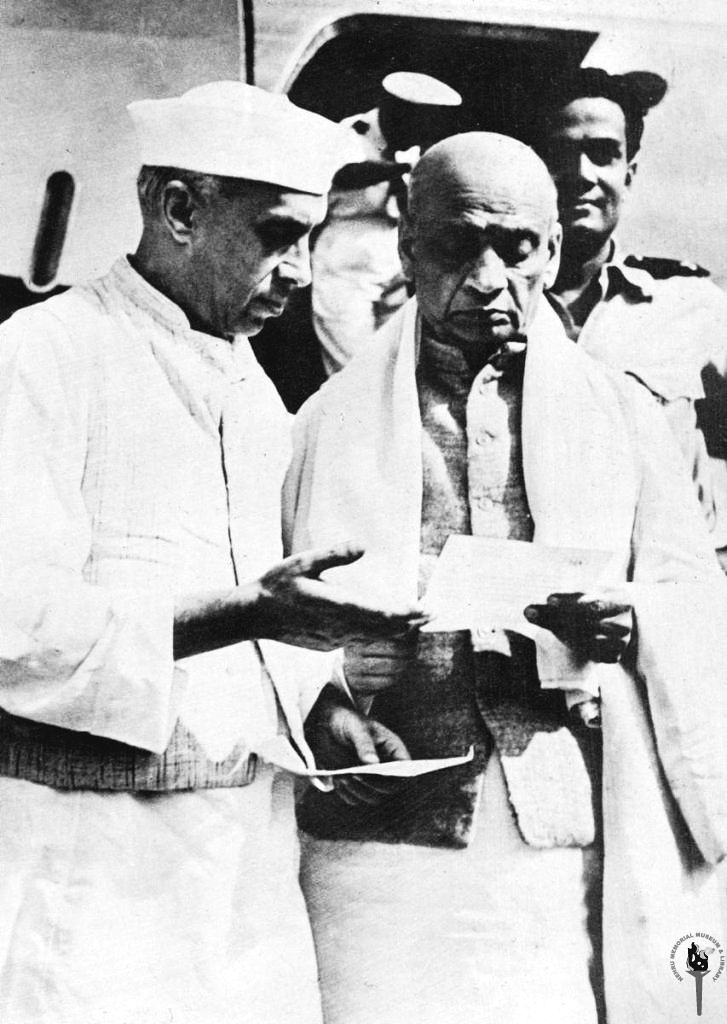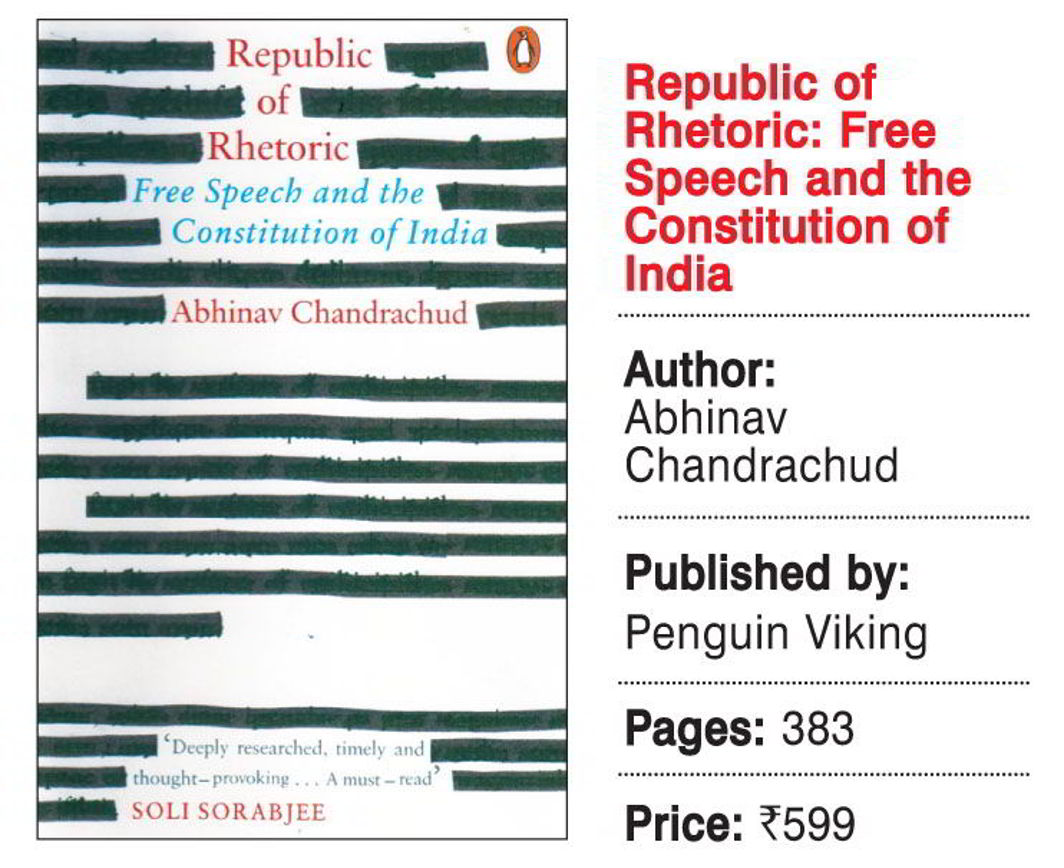Above: On numerous occasions, Nehru warned against allowing untramelled speech, especially hate speech. Photo: Wikimedia
In Republic of Rhetoric-Free Speech and the Constitution of India, Harvard-educated Abhinav Chandrachud’s key thesis is that a closer look at the history and evolution of the Constitution of India reveals that its enactment made little or no substantive difference to the right to free speech in India. Rather, it continues to remain imprisoned in the colonial continuities. To substantiate this thesis, Abhinav, who is the grandson of former CJI YV Chandrachud and son of sitting Supreme Court judge Dr DY Chandrachud, places emphasis on the historical context of the legal status of free speech in India, including a detailed treatment of events before 1947. He suggests that colonial-era restrictions on free speech like sedition, obscenity, contempt of court, defamation and hate speech were not merely retained but also strengthened in post-independence India. Through an analysis of decisions of the Supreme Court and various high courts, this Bombay High Court lawyer demonstrates how lawmakers’ desire to protect the totems of a newly independent India resulted in stronger fetters being imposed. Extracts:
In June 1950, Nehru wrote to Patel and said that the ‘chief culprit’ against the smooth working of the Nehru-Liaquat Pact was ‘Hindu Mahasabha propaganda’, ‘the Calcutta Press as well as Syama Prasad Mookerjee’. Patel was disturbed by the decisions of the Supreme Court in the RomeshThapar and Brij Bhushan cases. Patel thought that these decisions now made it impossible for the government to take any action against Mookerjee and other more extreme persons. Patel was of the opinion that the Constituent Assembly had drafted very idealistic provisions in the Constitution which were not rooted in practical considerations. In a letter to Nehru dated 3 July 1950, Patel wrote as follows:

‘I find no legal powers to deal with either Press or men like Syama Prasad Mookerjee. Before you left for Indonesia, I drew your attention to the Supreme Court decision in [the] Cross Roads and Organiser cases. That knocks the bottom out of most of our penal laws for the control and regulation of the Press. The views which they have expressed in that judgment on the question of sedition make it doubtful whether we can do anything not only about the speeches of Syama Prasad Mookerjee but also those of the more extremist type. As you say, we have involved ourselves in so many legal and constitutional difficulties that we do not know how to overcome them. I sounded a note of warning and caution when these provisions were being debated in the Drafting Committee, but then we were led away by our idealistic exuberance. We seldom paused to consider the practical and administrative applications of the many constitutional provisions and even their interrelation. My own feeling is that very soon we shall have to sit down and consider constitutional amendments.’
The decision of the Patna High Court in Shaila Bala Devi was delivered on 13 October 1950. Six days later, Nehru wrote to Law Minister B.R. Ambedkar, opining that the right to free speech required amendment. Indeed, Mookerjee went on to make several more speeches bordering on calling for war between India and Pakistan and for their forcible reunification. In a speech made in Parliament in August 1950, for instance, Mookerjee suggested that the Government of India must declare war on Pakistan in order to protect Pakistan’s Hindu minority, and that the entire basis of partition had been undone by Pakistan’s failure to protect its Hindu minority. In September 1950, Mookerjee said in Calcutta that the government’s ‘present policy of appeasement of Pakistan must cease’, and that either economic sanctions must be imposed or ‘military action’ must be taken against it… In December 1950, Mookerjee spoke at an RSS function where he said that the partition of India had ‘brought misery and humiliation to millions’. In a speech in Parliament that month, Mookerjee said that ‘we are supposed to be at war with Pakistan in Kashmir’, that India’s policy towards Pakistan should be based on ‘complete reciprocity’, and that if the ‘situation worsens’, ‘India will have to depend . . . on her arms and ammunitions or military strength’. In March 1951, Mookerjee said in the Lok Sabha that ‘Pakistan wanted war’, and that if they still wanted it, ‘let them have the taste of that’.
In October 1951, at his presidential address at the founding of the All India Bharatiya Jana Sangh, he said:
We already know that the partition of Bharat was a tragic folly. It has served no purpose and has not helped to solve any problem, economic, political or communal. We believe in the goal of reunited Bharat …
Justice Sarjoo Prasad’s judgement in the Shaila Bala Devi case which allowed even unrestricted incitement to murder, became a thorn in Nehru’s side. He repeatedly criticised it.

On 12 May 1951, a Bill was introduced in the provisional Parliament, to amend certain articles of the Constitution, including Article 19(2).46 The explanatory Statement of Objects and Reasons to the Bill, signed by Nehru himself, said that the right to free speech in India ‘has been held by some courts to be so comprehensive as not to render a person culpable even if he advocate’s murder and other crimes of violence’, an obvious reference to Justice Sarjoo Prasad’s judgment in Shaila Bala Devi. Things progressed at a hurried pace thereafter. Nehru issued a circular, instructing members of his party to be present in Parliament, despite the scorching heat of Delhi in May. On 16 May 1951, Nehru moved a motion to refer the Bill to a Select Committee in Parliament. The Select Committee was to consist of twenty-one members, including K.T. Shah, Sardar Hukam Singh, Naziruddin Ahmad, B.R. Ambedkar and R.K. Sidhva, who we have seen; played a part in the drafting of the right to free speech under the Constitution. It must be noted, in all fairness and to the government’s credit, that Syama Prasad Mookerjee, whose speeches were being viewed with suspicion by the government, was also made a member of the Select Committee. However, now Nehru himself, who had earlier taken almost no role in drafting Article 19(2) of the Constitution, was also a member of the Select Committee. The amendment to the right to free speech was finally passed in June 1951, with 228 members voting in favour of it and only nineteen voting against it.
Though this was not the official line, the restriction relating to ‘friendly relations with foreign States’ seems to have been thus motivated by an aim to restrict speech calling for India to go to war with Pakistan and to annul the partition. This House will realise,’ said Nehru in his speech in Parliament in support of the First Amendment, ‘that at this particular moment of a very delicate international situation and tension, we cannot easily take the risk when something said and done, not an odd thing said and done, but something said and done repeatedly and continuously, may lead in regard to foreign countries to the gravest consequences, may lead to our relations with that foreign country deteriorating rapidly.’
He was obviously referring to Pakistan. In another speech in Parliament, Nehru added, ‘If an individual does something which might result in war, it is a very serious matter. No State, in the name of freedom, can submit to actions which may result in wholesale war, and destruction.’ In yet another speech, Nehru defended the ‘friendly relations with foreign States’ exception in the following terms:
…suppose you do something which seems to us to incite to war, do you think we ought to remain quiet and await the war to come? …We cannot imperil the safety of the whole nation in the name of some fancied freedom which puts an end to all freedom … we are living in a very delicate state of affairs in this world, when words, whether oral or written, count; they make a difference for the good or for the bad. A bad word said out of place may create a grave situation, as it often does.
Syama Prasad Mookerjee, in his speech in Parliament against the First Amendment, said that partition was a mistake and that it should be undone some day, even by force. He said that he did not know whether the ‘friendly relations with foreign states’ exception related to ‘the demand which is made in certain quarters about a possible reunion of India and Pakistan’. He said that he knew that ‘the Prime Minister holds very strong views about it and he has said a number of times that any such movement or agitation is harmful to the interests of the country and that he does not like it.’ In fact, Mookerjee had consulted senior advocate Narotam Singh Bindra on the proposed constitutional amendment. Bindra had informed Mookerjee that the amendment would debar Indians from ‘making any comment with respect to the activities of Pakistan in connection with the evacuee property within its territories or with respect to the policy of the Government of India in this behalf’.
However, the official line was that the ‘friendly relations with foreign states’ exception was intended merely to prevent defamation of foreign state heads. This kind of restriction had previously been imposed by the colonial government. For example, it was imposed in 1915, during the First World War.
JUSTICE SARJOO PRASAD’S JUDGMENT
It is certain that the decision of the Patna High Court in Shaila Bala Devi, particularly, the chilling passage of Justice Sarjoo Prasad’s judgment, was the immediate cause for introducing the words ‘incitement to an offence’ into Article 19(2). Apart from the Statement of Objects and Reasons, Justice Prasad’s judgment was spoken about by several members in Parliament during the debates on the First Amendment. Nehru referred to the Patna High Court judgment in two separate speeches. ‘The House knows,’ he said, ‘that one of the High Courts held that even murder or like offences can be preached. Now it is an extraordinary state of affairs if that can be done.’ ‘Why is this amendment brought?’ Nehru asked himself in another speech in support of the amendment in Parliament, ‘I think it was the Bihar High Court which said something to the effect that preaching of murder is allowed under this clause,’ he continued. Home Minister C. Rajagopalachari also referred to the Patna High Court judgment in his speech in support of the Bill. When Syama Prasad Mookerjee argued against the Bill, some members interrupted, saying, ‘Ask the High Courts . . . A person can preach murder and still go scot-free.’
HATE SPEECH
Many members in Parliament supported the amendment because it enabled the government to deal with hate speech. ‘I am ashamed of the Press,’ said Pandit Krishna Chandra Sharma. He added: ‘Thousands of people have been murdered on account of the false reports published in the Press regarding Hindu-Muslim riots.’ According to Chandra, in 1947, a Delhi daily newspaper falsely reported that fifty Hindus had been killed by Muslims in communal attacks, and as a consequence, thirty Muslims were killed in retaliatory attacks by Hindus on the following day. ‘Who is responsible for these [thirty] lives?’ asked Chandra.
‘How many of you remember,’ asked Nehru, ‘or have you forgotten, three-and-a-half years ago, in this city of Delhi in the month of September 1947, in Punjab, in that entire body of Western Pakistan, what had happened?’ He continued, ‘anything that goes towards disrupting the community, anything that goes towards creating communal discord in this country will be met with the heavy hand of this government. I am not going to allow anything coming in the way of the freedom and unity of India,’ he said, strongly. Even in February 1950, Nehru had written a letter to Patel in which he had said that there was ‘a constant cry for retaliation and of vicarious punishment of the Muslims of India, because the Pakistanis punish Hindus’. The ‘public order’ exception was particularly geared towards restraining hate speech or speech which incited communal violence , especially against the political backdrop of the Nehru-Liaqat Pact.


